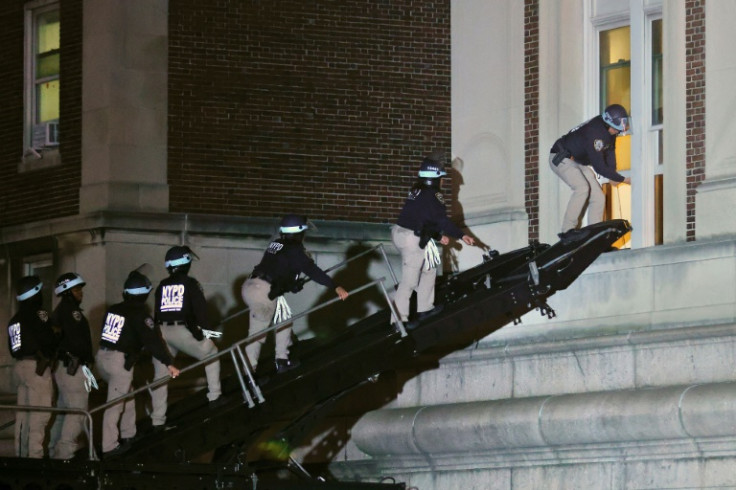Police Tackle US Campus Protests As Los Angeles Hit By Clashes

Hundreds of people were arrested at pro-Palestinian protests on US campuses as police Wednesday extended a crackdown that included clearing out demonstrators occupying a building at Columbia University in New York.
On the other side of the country, counter-protesters attacked a pro-Palestinian encampment at the University of California, Los Angeles as violent clashes erupted in the dark before police intervened.
At Columbia, the center of nationwide protests, police were on standby Wednesday after their overnight operation dismantled a weeks-long encampment and forcibly removed people occupying an academic building.
Demonstrators have gathered in at least 30 US universities to protest the soaring death toll from Israel's war with Hamas in the Gaza Strip, many demanding college authorities end investments in Israeli companies.
About 300 arrests were made at Columbia and another New York college on charges including trespass, criminal mischief and burglary, Police Commissioner Edward Caban told a news conference Wednesday.
"Public safety was a real concern, especially after the protesters escalated the situation by breaking and entering into a university building, and the NYPD was called in to do their job," he said.
Mayor Eric Adams blamed "outside agitators" who entered Columbia's campus for ratcheting up tensions.
"These external actors (have) a history of escalating situations and trying to create chaos, not to peacefully protest," he said.
The unrest has swept through US higher education institutions, with student protesters erecting tent encampments on campuses from coast to coast.
The protests have posed a challenge to university administrators trying to balance free speech rights with complaints that the rallies have veered into criminal activity, anti-Semitism and hate.
At Columbia, police climbed into the barricaded Hamilton Hall via a second-floor window before leading people in handcuffs out of the building into vans.
In Los Angeles, fireworks were hurled as counter-protesters sprayed chemical substances onto a pro-Palestinian encampment and attempted to tear down wooden boards and metal barricades, AFP journalists saw.
Several protesters were also beaten on the ground.
Los Angeles police eventually arrived to restore calm, with a large presence remaining on Wednesday.
One protester, UCLA doctoral student Vincent Doehr, voiced outrage at the university for not preventing the violence, saying it had been warned about the counter-protesters, whom he described as being pro-Israel.
"They still allowed them onto campus and to attack us using weapons such as pepper spray, mace, boards, bricks, fireworks," he told CNN.
LA mayor Karen Bass said the violence was "absolutely abhorrent and inexcusable."
Elsewhere, police moved in Wednesday at the University of Wisconsin at Madison and arrested several protesters, TV footage showed.
Earlier at the University of Arizona, police said they were "deploying chemical irritant munitions" to disperse "an unlawful assembly."
In contrast, Brown University reached an agreement in which student protesters will remove their encampment in exchange for the institution holding a vote on divesting from Israel -- a major concession from an elite American university.
The weeks of demonstrations -- possibly the most sweeping and prolonged unrest to rock US college campuses since the Vietnam war protests of the 1960s and 70s -- have also become a political flashpoint in an election year.
President Joe Biden's White House sharply criticized the protesters' seizure of Hamilton Hall, with a spokesman saying it was "absolutely the wrong approach."
Former president Donald Trump on Fox News lamented the "anti-Semitism that's just pervading our country," and slammed Biden, his rival in the November presidential election for inaction.
The Gaza war started when Hamas militants staged an unprecedented attack on Israel on October 7 that left around 1,170 people dead, mostly civilians, according to an AFP tally of Israeli official figures.
During their attack, militants also seized hostages, 129 of whom Israel estimates remain in Gaza, including 34 whom the military says are dead.
Israel's retaliatory offensive has killed at least 34,535 people in Gaza, mostly women and children, according to the Hamas-run territory's health ministry.

© Copyright AFP 2024. All rights reserved.





















